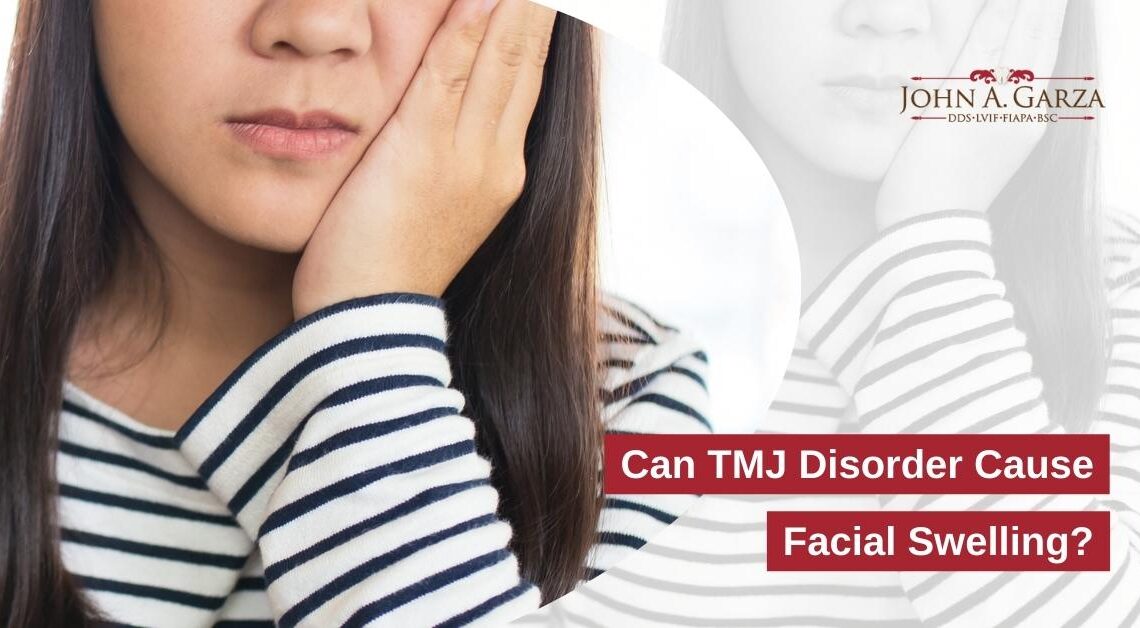TMJ dysfunction may be the cause of your jaw pain. Without adequate treatment, TMJ issues can become more severe and even debilitating.
One telltale indicator of a TMJ issue is recurrent jaw pain, stiffness, and decreased jaw function. However, there are situations when the signs are more prominent. TMJ issues can cause facial swelling, which should not be overlooked.
How TMJ Disorder Works
TMJ issue, which affects more and more people, tends to get worse over time, as evidenced by the rising incidence of TMJ diagnoses. When teeth don’t line up properly, the joint capsule between the skull and the jawbone is damaged. Detection can be a challenge, and some people have had symptoms for years. TMJ responds well to treatment once it is recognized.
According to the 2020 National Academy of Medicine Report on TMJ, patients with temporomandibular disorders often have difficulty with daily tasks such as eating and speaking (TMDs). Many of them experience severe chronic pain as a result of this disorder. Regular social interactions, such as smiling, laughing, and kissing, might become intolerable. This dysfunction and agony and the accompanying suffering have a devastating impact on affected individuals, their families, and their friends.
Signs & Symptoms / Diagnosis
Your TMJ is a vital joint in everyday activities. Soreness, stiffness, and swelling are all immediately apparent. The symptoms of TMJ issues can take a variety of forms, making early detection difficult.
TMJ pain can begin suddenly, or it may build gradually over time. Arthritis, wear and tear, bite misalignment, and acute trauma to the face are among the most common reasons. TMJ issues can be caused by patients unintentionally clenching or grinding their teeth (bruxism).
- Your jaw may feel painful or inflamed.
- Having pain in your neck or shoulders
- There is a tingling or aching sensation in the face.
- Swelling on one side of your face
- In or around the ear, ear pain
- An unpleasant sensation in the mouth caused by chewing.
- Toothaches
- Headaches
- Dizziness
- Hearing loss or ringing in the ears (tinnitus)
- It’s tough to open and shut your mouth while your jaw is locked.
- You may notice a clicking or grating sensation when you open and close your mouth.
Can TMJ Disorder Affect Facial Swelling?
TMJ disorder and cheek pain are related. There are many TMJ structures that might be affected by inflammation in the temporomandibular joint. Inflammation occurs as a result of infection or injury to the tissues, resulting in swelling and redness. There are many causes of TMJ, including trauma, arthritic illness, and other causes. Pain ensues as a result of the inflammation.
In TMJ, the inflammation does not remain confined to the jaw joint. Instead, it spreads to other tissues in the vicinity. Consequently, the cheek and temple regions of the head and face may be affected. Unlike other causes of pain in similar places, discomfort in the cheeks and temples due to TMJ worsens with jaw movement and improves with jaw relaxation. In contrast, various types of motion increase other causes of cheek and temple pain. Alternatively, jaw movement has no effect on the pain.
Treating TMJ issues early on is the greatest way to avoid having to deal with face changes as a result of the illness. TMJ issues can be detected when you visit your Boston dentist for regular cleanings and examinations. Our goal is to assist you in obtaining the treatment you need as soon as possible if we see any abnormal wear and tear, clicking or popping, or if you are experiencing jaw pain. It is best to begin treatment as soon as possible in order to avoid face alterations.
How to Relieve / Treat Facial Swelling
If you have a TMJ problem, you may notice a noticeable increase in the size of your face muscles. As a result of a severe TMJ issue or jaw misalignment, you may be more likely to experience facial swelling.
You may develop inflammation around the joint capsule of your jaw if your TMJ becomes painful. As a result, joint deterioration can occur, as well as more severe pain.
You may only experience mild to severe swelling on one side of your face. Discomfort’s possible to notice that it worsens when you open your mouth, but it can also remain if you have a serious TMJ condition.
As long as you feel that your TMJ problem is caused by inflammation rather than an injury or other issue, there are therapies that help minimize the swelling and discomfort associated with TMD. Ice or cold packs can be used to reduce inflammation in the joint.
Another option for treating TMJ irritation is the use of nonsteroidal anti-inflammatory medicines (NSAIDs), such as aspirin, Aleve, Tylenol, Advil, or Motrin. Massage of the jaw and neck muscles, as well as stress management techniques, can all help alleviate symptoms of a swollen or irritated TMJ.
Treatment options for TMJ disorders are numerous. Injections and open surgery are two of the most common methods of treatment. Your own home might serve as your first line of defense. If you’ve exhausted all of your alternatives for jaw therapy at home, you may need to see your doctor about a prescription for something stronger. The majority of medical professionals feel that conservative, non-surgical treatments should be used first, and surgery should only be used as a last resort.
Consult with Garza DDS to learn more about TMJ swelling
If you are experiencing facial swelling and believe it to be a result of TMJ disorder, please consult with Garza DDS. He has the experience and knowledge to help identify the source of your facial swelling and provide you with the best treatment plan possible. Remember, early diagnosis is key to preventing more serious damage from occurring. Contact us today to book your appointment!


